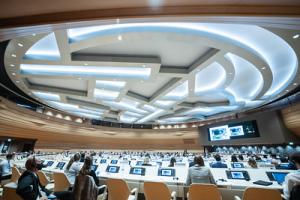
The 3rd Forum of Mayors will bring together some 50 city leaders from around the world at the United Nations in Geneva on 2-3 October to share practical experiences of urban regeneration, and to help harness cities’ unique role in addressing some of the key challenges of our time.
Mayors will focus on concrete projects to achieve more inclusive, resilient and sustainable urban development, and set out Recommendations – including a set of principles on urban regeneration – to be submitted to UNECE’s Committee on Housing, Land Management and Urban Development for consideration at its 84th Session on 4-6 October.
As a unique mechanism within the United Nations system that links local and national authorities in a normative intergovernmental framework, the Forum of Mayors is helping to put into practice a stronger, more networked and inclusive multilateralism.
UNECE Executive Secretary Ms. Tatiana Molcean stated: “With some 75% of the population of the pan-European region and North America already living in cities, UNECE member States have consolidated the Forum of Mayors as a platform to deepen collaboration between different levels of government, both within and between countries. The participation of over 10 Mayors from Africa, Asia, Latin America, the Middle East and North Africa further underscores the relevance of the Forum in a multi-polar global context, where all regions stand to benefit from dialogue and knowledge transfer”.
The Forum will be chaired by Mr. Sami Kanaan, Deputy Mayor, Member of the Administrative Council of the City of Geneva (Switzerland), alongside Vice-Chairperson Mr. Ihor Terekhov, Mayor of Kharkiv (Ukraine). The Forum’s keynote address will be given by architect Lord Norman Foster, Advocate of the 2023 Forum of Mayors, who has accompanied the Forum since its inception.
Representing a diversity of urban contexts from across the pan-European region and North America, the Forum will bring together leaders of Tirana (Albania), Andorra la Vella (Andorra), Ijevan (Armenia), Vienna (Austria), Baku (Azerbaijan), Ghent (Belgium), Banja Luka (Bosnia and Herzegovina), Split (Croatia), Nicosia (Cyprus), Prague (Czechia), Tallinn (Estonia), Helsinki (Finland), Dijon (France), Tbilisi (Georgia), Athens (Greece), Veszprém (Hungary), Reykjavík (Iceland), Dublin (Ireland), Rome (Italy), Almaty (Kazakhstan), Bishkek (Kyrgyzstan), Jonava (Lithuania), Ta’ Xbiex (Malta), Podgorica (Montenegro), Skopje (North Macedonia), Braga (Portugal), Cugir city, Alba County (Romania), Kazan (Russian Federation), San Marino, Bratislava (Slovakia), Granollers (Spain), Malmö (Sweden), Lausanne (Switzerland), Dushanbe (Tajikistan), Gaziantep (Türkiye), Ashgabat (Turkmenistan), Glasgow (UK), and Mykolaiv (Ukraine). Additional Mayors are expected to confirm their participation.
Recognizing the interconnections between urban areas around the world and the opportunities for learning, partnerships and exchange, an interregional segment on urban regeneration will bring together Mayors from the UNECE region with their counterparts from cities including Navarro (Argentina), Cotonou (Benin), Otavalo (Ecuador), Damietta (Egypt), Dire Dawa (Ethiopia), Amman (Jordan), Rabat (Morocco), Naga (Philippines), Kigali (Rwanda), Dodoma (Tanzania), Nakhon Si Thammarat (Thailand).
A rich programme of side events will address pressing issues such as the underrepresentation of women in leadership roles within local governments (in only 8 UNECE member States with available data are 40% or more of seats held by women in local governments, compared to 13 countries where 40% or more of seats are held by women in national parliaments); local communities’ role in building sustainable food systems; urban peace dialogues; and cities’ experience of Voluntary Local Reviews of SDGs progress.
Cities are on the front line of addressing humanity’s most pressing challenges, from climate change to migration as well as natural disasters and socioeconomic inequality. As the world is becoming more urbanized, these challenges cannot be addressed by national governments alone. Cities have become key actors in tackling these challenges and supporting the efforts to achieve the Sustainable Development Goals of the 2030 Agenda for Sustainable Development in the remaining seven years.
More information on the Forum, including its programme and timetable, is available at https://forumofmayors.unece.org/

